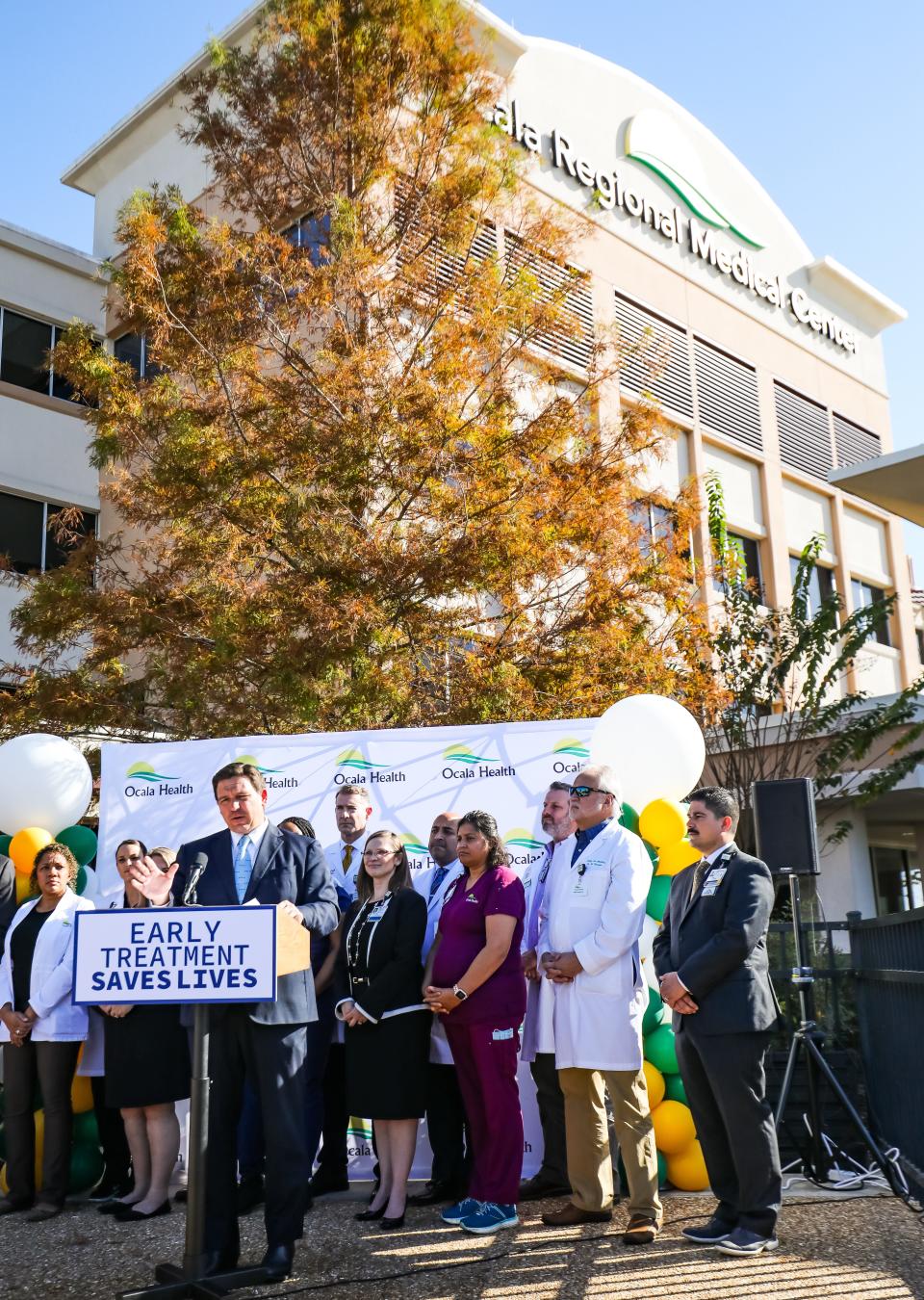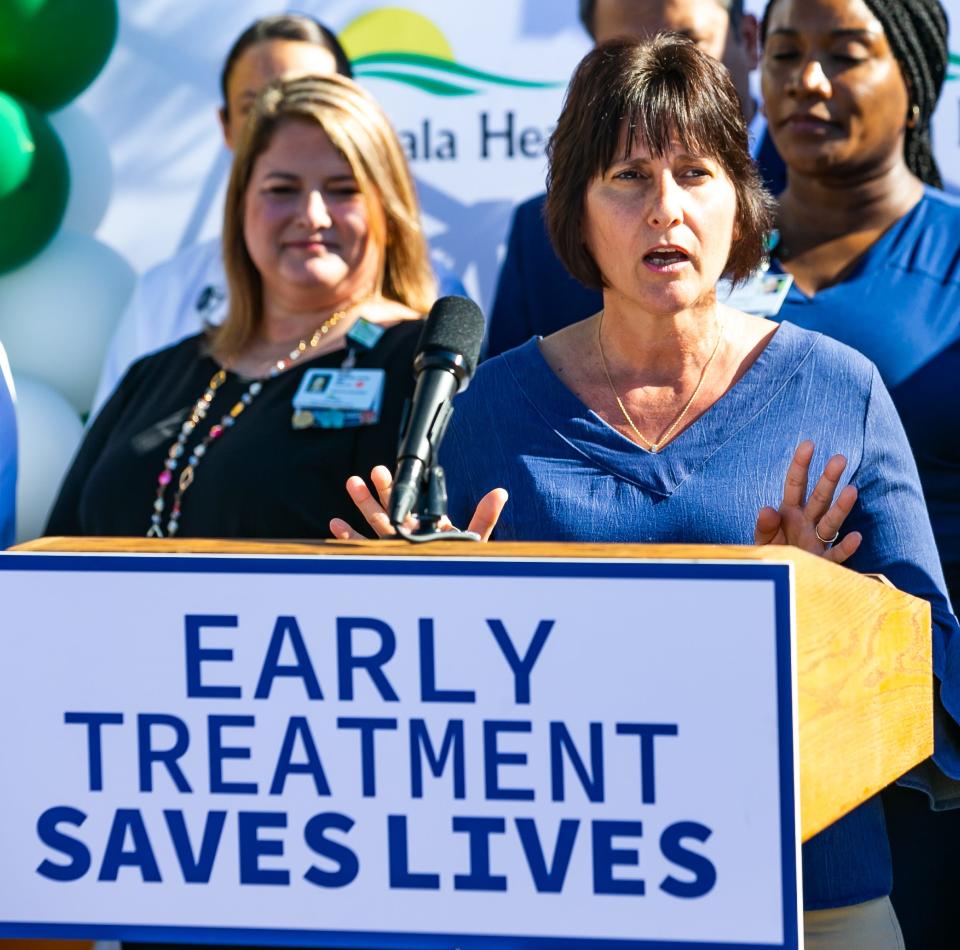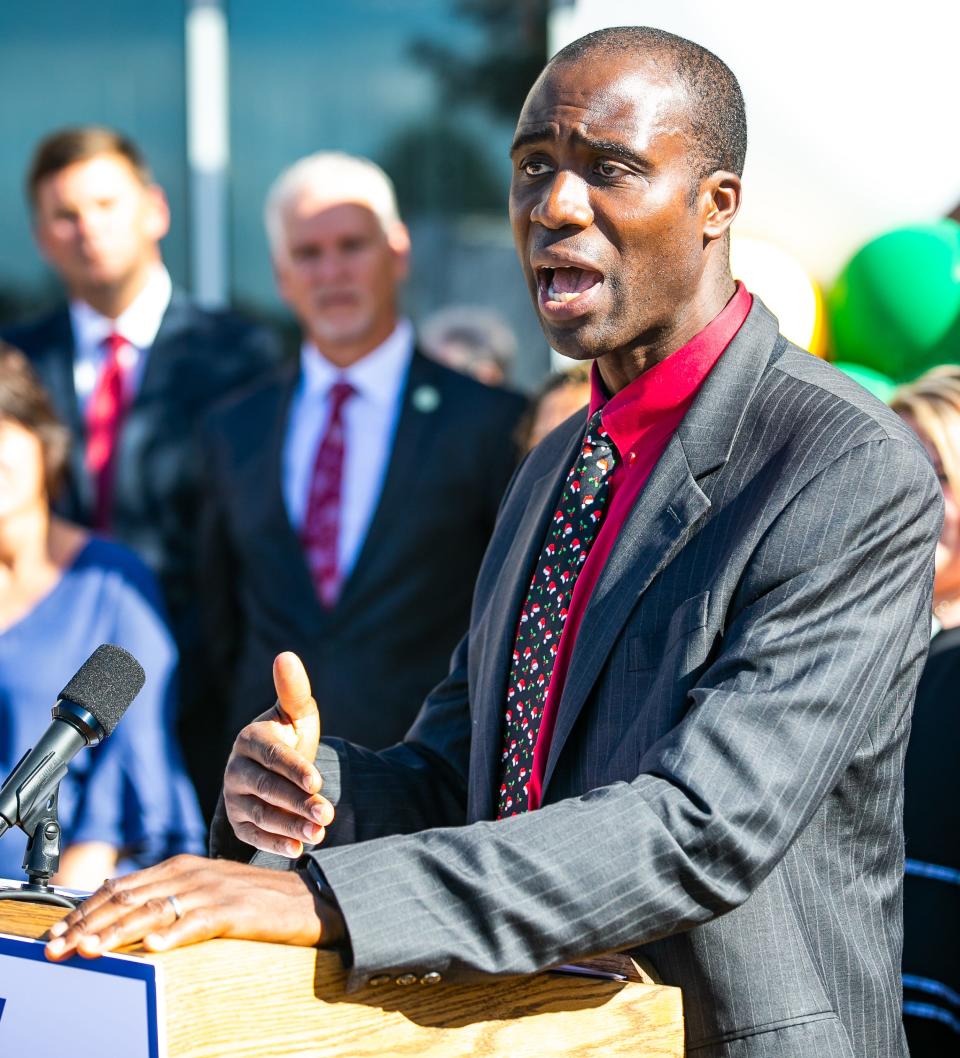DeSantis announces preventative COVID-19 monoclonal treatment available on limited basis
- Oops!Something went wrong.Please try again later.
- Oops!Something went wrong.Please try again later.
Florida Governor Ron DeSantis visited Ocala Regional Medical Center Friday morning to announce the state’s allocation of 3,100 doses of Astrazeneca’s Evusheld, an antibody combination intended to prevent individuals from contracting COVID-19.
The Food and Drug Administration granted emergency use of the pre-exposure prophylactic on Dec. 8, and DeSantis promoted its use, primarily for immunocompromised individuals who are advised against getting vaccinated or who had an insufficient response to the vaccine, as part of the state’s continued “Early Treatment Saves Lives” campaign.
“This is a long-lasting, long-acting monoclonal therapy,” DeSantis said, noting its effectiveness at preventing the virus for up to six months. “In the clinal trials, it reduced the risk of developing COVID in the first instance by 77%.”
Health care developments: UF Health one step closer to building a neighborhood hospital in west Ocala near I-75
COVID-19 update: 10 new Ocala/Marion school cases last week, down 41.2% in one week

The “limited allocation” of around 3,100 doses will be distributed to the state’s hospitals and clinics that are already performing monoclonal antibody treatments, which DeSantis and Florida have promoted since earlier this year for treating COVID-19 patients.
DeSantis encouraged individuals to visit floridahealthcovid19.gov to find monoclonal antibody therapy sites. The goal is to have Evusheld available within two hours of all Florida residents.
“I think this is a positive development to be able to have this, especially given that it really will serve a valuable purpose for some of those folks who are very high risk and do need some additional help,” he said.

Not a substitute for vaccine where recommended
Angela Wells, a second-grade teacher from Marion County, spoke at the press conference about her experience as a Type 1 diabetic who had been advised not to get the COVID-19 vaccine. She ended up contracting the virus and received monoclonal antibody treatment at Ocala Regional Medical Center afterwards.
"It was like a light switch. The plug had been unplugged and all the symptoms had resolved, and I'm still amazed that it happened so quickly," she said, explaining that her symptoms briefly worsened and then disappeared the day after treatment.
DeSantis stressed that the new Evusheld treatment for use prior to infection is different from the Sotrovimab and Regeneron monoclonal antibody treatments for use after infection.
“The monoclonal results have been very, very good in the real world and the clinical trial, so our hope is that this performs in line with that,” he said.
According to the FDA, Evusheld is authorized for individuals not currently infected or recently exposed to an infected individual. Individuals must have either “moderately to severely compromised immune systems” that may not mount an adequate response to COVID-19 vaccinations or a history of severe adverse reactions to the vaccines or their components.
“You see that with certain cancer patients, transplant recipients,” DeSantis said of potentially eligible individuals. He also stressed Florida’s efforts to “provide protections for people against forced vaccinations,” referring to the Biden administration’s vaccine mandates, which are currently being challenged in court.
Evusheld is not authorized for treating COVID-19 after exposure and is not a substitute for vaccination in individuals for whom it is recommended, according to the FDA.
The product is composed of monoclonal antibodies tixagevimab and cilgavimab that are designed to block the virus from attaching to and entering human cells, mimicking the immune system’s ability to fight off pathogens.

Florida will stress treatment as Omicron spreads
DeSantis, echoed by Surgeon General Joseph Ladapo, stressed that “COVID-19 is not the sum total of what it means to be healthy,” however, pointing to the state’s Healthier You initiative to promote active lifestyles amidst the continuing pandemic.
Ladapo, who has been questioned for opposing COVID-19 precautions like mask mandates and advocating for alternatives to vaccination, also addressed the omicron variant of the virus that originated in South Africa, which has started spreading throughout the United States and Florida.
DeSantis said he expects cases to rise in January again, following a similar cycle as last year.
“With this omicron, it’s very clear that it’s highly transmissible,” Ladapo said. “The data do not indicate any increased risk. If anything, the data seem to support a lower risk of serious illness. We’ll know more with time, and hopefully that holds.”
What was clear, however, is that Florida will continue taking a treatment-focused approach, including through monoclonal antibodies before or after infection rather than mandates and closures.
“We are not going to indulge in any of the insanity that you see happening again in some of these parts of the country,” DeSantis stated, referencing colleges that are shutting down despite mandating masks and vaccinations. “A lot of those heavy-handed policies have been total failures, and we’re certainly not going to be indulging that.”
Contact reporter Danielle Johnson at djohnson@gannett.com.
This article originally appeared on Ocala Star-Banner: Gov. Ron DeSantis says new monoclonal treatment coming to Florida
